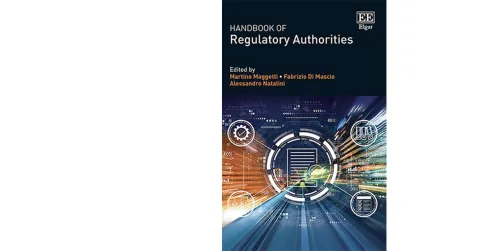
La Cattedra JM on EU Approach to Better Regulation è lieta di diffondere la notizia della pubblicazione dell'Handbook of Regulatory Authorities, curato dai proff. Martino Maggetti, Fabrizio Di Mascio e Alessandro Natalini. L'Handbook, caratterizzato da una raccolta analitica di ricerche interdisciplinari sulle autorità di regolamentazione, include il capitolo 11 "Agencies regulating risks", scritto dalla prof.ssa Nicoletta Rangone (titolare della Cattedra), insieme al Dr. Lorenzo Allio.
Il libro, che si apre con una panoramica comparativa delle autorità di regolamentazione nelle varie regioni del mondo, dei settori e dei tipi di regolamentazione, affronta le questioni concettuali chiave della regolamentazione: indipendenza, politicizzazione e qualità. I contributi di importanti studiosi e professionisti della regolamentazione forniscono ricerche all'avanguardia su reputazione, performance e controllo delle autorità. I capitoli combinano concetti teorici fondamentali con la ricerca empirica per considerare i progressi, le sfide e le domande emergenti nel campo, dando anche peso all'esame critico di questioni complesse e poco esplorate nella ricerca sulle autorità di regolamentazione. Il manuale si conclude ampliando l'attenzione per analizzare le intuizioni comportamentali, l'innovazione, la definizione dell'agenda e le nuove frontiere della regolamentazione.
Con un approccio interdisciplinare, l'Handbook intende rivelarsi prezioso per gli studenti e gli studiosi di politica, diritto ed economia, con una prospettiva di governance normativa. In particolare, si rivolge a scienziati politici, operatori e responsabili che lavorano nel campo della regolamentazione e delle relative autorità.
Il libro, anche per la consultazione dell'indice, è disponibile qui.
ENG
The JM Chair on EU Approach to Better Regulation is pleased to share the news of the publication of the Handbook of Regulatory Authorities, edited by Professors Martino Maggetti, Fabrizio Di Mascio and Alessandro Natalini. The Handbook, characterised by an analytical collection of interdisciplinary research on regulatory authorities, includes Chapter 11 'Agencies regulating risks', written by Prof. Nicoletta Rangone (Chair), together with Dr Lorenzo Allio.
Opening with a comparative overview of regulators across global regions, regulatory sectors, and regulatory types, the Handbook discusses the key regulatory conceptual issues of independence, politicization, and quality. Contributions from leading scholars and regulatory practitioners provide cutting-edge research on reputation, performance, and control in regulatory authorities. Chapters combine foundational theoretical concepts with empirical research to consider the emerging advances, challenges, and questions in the field, while also giving weight to critical examinations of complex and underexplored issues in research on regulatory authorities. Forward-thinking, the Handbook concludes by expanding its focus to analyse behavioural insights, innovation, agenda-setting, and new frontiers in regulation.
The Chapter focuses on the role played by related regulatory agencies to ensure that risk management decisions are shaped so as to ensure both high levels of protection and level-playing fields for innovation. Indeed, “Getting the risk governance right” has become topical for today’s government because of the salience of several, concomitant phenomena (for instance, covid-19 and the agenda 2030).
Besides, the authors’ analysis provides a canvas for considering six among the most topical themes that they believe specifically affect our understanding of agencies regulating risk.
The themes discussed in the chapter are:
- Risk regulation after COVID-19: Insights and lessons from a global crisis
- Reaping the potential of innovation: What is there for risk regulation?
- The governance of risk regulation: What is at stake?
- The essential input to effective risk regulation: scientific integrity
- Risk regulation 2.0: The role of Big Data in risk management
- “Humanising” risk regulation: Leveraging behavioural research
The concluding idea is to shape “Better Risk Regulation”, which is deemed to be necessary for governments to adequately address the challenges and meet the opportunities of contemporary society.
With a cross-disciplinary approach, this all-encompassing Handbook will prove invaluable for students and scholars of politics, law, and economics with a regulatory governance perspective. Global in scope, it will be an essential point of reference for policy analysts, practitioners, and policymakers working in regulation and regulatory authorities.
The book is available here.
Submitted on Mon, 08/22/2022 - 23:03

